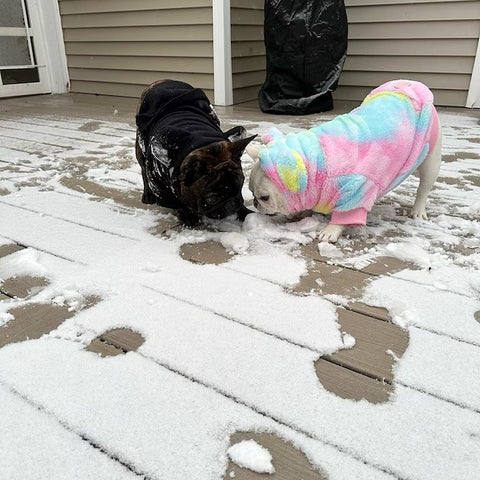Your Cart is Empty
🔥 CLOSE OUT SALE 🔥50% OFF sitewide use code clear final sale, no returns or refunds
🔥 CLOSE OUT SALE 🔥50% OFF sitewide use code clear final sale, no returns or refunds
🔥 CLOSE OUT SALE 🔥50% OFF sitewide use code clear final sale, no returns or refunds

Discovering that your beloved French Bulldog has indulged in a rather unappetizing snack of feces can be a disconcerting experience for any pet owner. Coprophagia, the consumption of feces, is a relatively common behavior in dogs, but it can raise concerns about their health and hygiene.
First and foremost, it's essential to recognize that coprophagia is a natural behavior observed in many dogs, including French Bulldogs. While the idea of consuming feces may be repulsive to humans, dogs may engage in this behavior for various reasons, including:
Nutritional Deficiencies: In some cases, dogs may eat poop to compensate for dietary deficiencies, particularly if they are not receiving adequate nutrients from their regular diet.
Instinctual Behavior: Historically, wild canines may have consumed feces as a means of scavenging for nutrients or to keep their den clean and free of parasites.
Attention-Seeking: Dogs may eat poop as a form of attention-seeking behavior, especially if they receive a strong reaction from their owners or if they feel neglected.
Medical Issues: Certain medical conditions, such as malabsorption disorders or pancreatic insufficiency, may lead to coprophagia as a symptom of an underlying health problem.
While the thought of your furry companion consuming feces may be unsettling, the good news is that in most cases, eating their poop is unlikely to cause serious harm to your dog. However, there are some considerations to keep in mind regarding the health implications:
1. Parasite Transmission: One of the main risks associated with eating feces is the potential transmission of intestinal parasites or infectious agents. If your dog consumes the feces of another animal that is infected with parasites such as roundworms, hookworms, or giardia, they may become infected themselves. Regular deworming and fecal testing can help detect and treat any parasitic infections.
2. Bacterial Contamination: Feces can harbor harmful bacteria such as Salmonella, E. coli, and Campylobacter, which can cause gastrointestinal upset and bacterial infections if ingested. While healthy adult dogs may have some degree of resistance to these bacteria, puppies, elderly dogs, and immunocompromised individuals may be more susceptible to illness.
3. Nutritional Deficiencies:While eating their own poop is generally not harmful to dogs in terms of nutrient absorption, repeated coprophagia may indicate underlying dietary deficiencies or malabsorption issues. If your dog is consuming their poop as a means of seeking nutrients missing from their diet, it's essential to address their nutritional needs.
4. Behavioral Concerns: Beyond the potential health risks, coprophagia can also indicate underlying behavioral or psychological issues that require attention. Dogs may engage in this behavior due to boredom, stress, anxiety, or attention-seeking, and addressing these underlying issues is crucial for preventing further episodes of coprophagia.

If you catch your French Bulldog in the act of eating poop or suspect that they have consumed feces, here are some steps you can take to address the situation:
Remove the Source: Immediately remove any feces from your Frenchie's vicinity to prevent further ingestion. Keep your yard, living space, and walking routes clean and free of waste to minimize the opportunity for coprophagia.
Consult Your Veterinarian: If your Frenchie's coprophagia persists or is accompanied by other concerning symptoms, such as gastrointestinal upset or weight loss, consult your veterinarian for a comprehensive evaluation. They can rule out any underlying medical conditions and provide guidance on appropriate dietary management or behavioral interventions.
Evaluate Your Frenchie's Diet: Review your Frenchie's current diet with your veterinarian to ensure it meets their nutritional needs. Consider switching to a high-quality, balanced diet formulated for French Bulldogs to address any potential nutrient deficiencies that may be contributing to coprophagia.
Provide Mental Stimulation:Engage your Frenchie in mentally stimulating activities and provide plenty of physical exercise to help redirect their focus and energy away. Interactive toys, puzzle feeders, and obedience training can help keep your Frenchie mentally and physically stimulated.
Address Behavioral Issues:If coprophagia is believed to be a behavioral issue, work with a professional dog trainer or behaviorist to implement positive reinforcement training techniques and address any underlying issues contributing to the behavior. Consistency, patience, and positive reinforcement are key to modifying your Frenchie's behavior effectively.
Utilize Cloth:Begin by wetting a face cloth or a piece of gauze with either salt water or coconut oil. Wrap it around your finger and gently insert it into the side of your puppy's mouth.
Thorough Wiping: Carefully wipe the gums, roof of the mouth, and tongue, if your puppy allows. Ensure you don't insert your finger too deeply to avoid triggering a gag reflex.
Consider Mouthwash: Doggy mouthwash, available commercially, can be beneficial. You can either add it to water or apply it directly to a cloth for use in your puppy's mouth. Avoid using human mouthwash at all costs.
Hydration and Nourishment:Offer your puppy water and food after cleaning. Eating stimulates saliva production, aiding in the natural cleansing of the mouth, while water helps to rinse away any lingering residue.
Provide Dental Chews:Equip your puppy with a dental treat or stick to chew on. These aids facilitate further cleaning by generating friction to dislodge debris and promote saliva flow.
Select the Right Toothbrush:Ideally, use a doggy toothbrush tailored to reach all corners of your puppy’s mouth. Alternatively, a child's toothbrush can suffice in a pinch.
Use Canine Toothpaste: Apply dog-specific toothpaste to the brush. Human toothpaste should never be used, as it can be harmful to dogs.
Access Teeth and Gums: Gently lift your puppy's lip to expose their teeth and gums, including the cheek flaps.
Gentle Brushing:Introduce the toothbrush into your puppy’s mouth and commence brushing their teeth with care. Patience is key, especially if this is a new experience for your puppy. Offer treats and praise to foster cooperation.
Thorough Rinse: Following the brushing session, wipe away any excess toothpaste with a damp cloth wrapped around your finger.

While occasional instances of coprophagia may be difficult to prevent entirely, there are steps you can take to minimize the likelihood of your Frenchie eating poop:
Dealing with coprophagia in French Bulldogs can be a challenging and unpleasant experience for pet owners, but with patience, consistency, and appropriate intervention, it's possible to address this behavior effectively. By understanding the underlying reasons and implementing strategies to prevent and manage the behavior.
Comments will be approved before showing up.

French Bulldogs, with their bat-like ears and affectionate personalities, have soared in popularity. However, their demand has fueled a surge in unethical breeding practices and scams, leaving many hopeful owners heartbroken or financially drained. This guide equips you with actionable steps to find ethical breeders, recognize red flags, and explore adoption alternatives—ensuring your Frenchie journey is safe, responsible, and rewarding.

For millions of pet owners, leaving a furry family member behind during travel is unthinkable. Whether for emotional support, medical necessity, or sheer companionship, the demand for pet-inclusive air travel has surged. By 2025, over 30 global airlines now permit cats and dogs in the cabin—a dramatic shift from just a decade ago, when pets were routinely relegated to cargo holds. This guide explores the evolving landscape of pet-friendly air travel, diving into airline policies, legal distinctions, health considerations, and tips for ensuring a smooth journey for all passengers, both human and animal.

Crate training is often associated with puppies, but it can be equally beneficial for older French Bulldogs. Whether your Frenchie is new to your home or simply hasn’t been crate trained before, introducing them to a crate can provide them with a safe and comforting space. Here’s how to do it effectively while keeping their unique personality and needs in mind.
Helpful information on the French Bulldog dog breed.
We will also notify you with new releases and special offers.
Informational posts about French Bulldogs. Tips and helpful advice on the Frenchie breed and other breeds.
Sign up to get information & expert advice about pets' health and safety. We will also notify you with new releases and special offers.
Nereida
January 11, 2025
Mi frenchie tiene 7 meses y sigue comiendo sus heces, y luego vomita , el hedor del vomito es horrible,eso lo hace mientras dormimos , que me recomienda.